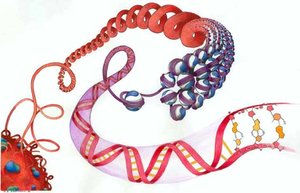 When someone is freaking out saying, “I have the MTHFR gene” it’s important to understand everyone is born with the MTHFR gene as part of their genotype, or collection of genes. In fact, everyone has two copies of this MTHFR gene. Having the MTHFR gene is not the issue. Our MTHFR gene is frigging awesome as far as genes go, have a read of our blog MTHFR – Say What? to find out all the things that this gene helps govern in the body.
When someone is freaking out saying, “I have the MTHFR gene” it’s important to understand everyone is born with the MTHFR gene as part of their genotype, or collection of genes. In fact, everyone has two copies of this MTHFR gene. Having the MTHFR gene is not the issue. Our MTHFR gene is frigging awesome as far as genes go, have a read of our blog MTHFR – Say What? to find out all the things that this gene helps govern in the body.
I urge you to also read our Methylation, MTHFR – WTF? blog to better understand how our genes (therefore our overall health) can benefit from habits that support good methylation.
When people say they are worried about having the MTHFR gene we need to realise that what they mean is – they have a MTHFR gene variation. Here’s another important take-home – gene variations have both beneficial and negative attributes. We don’t get one without the other, but gene variations are not all bad. It’s not all doom and gloom especially if you know how to look after your genes.
Should I be worried about my genes?
For too long people have wanted to blame genes for their poor health outcomes. They feel as though they are a victim to their genes. Maybe they feel like they lost with genetic lottery.
Growing up we learn all sorts of disempowering mistruths such as:
- being skinny or fat is genetic
- you’re stuck with the brain you were born with
- performance is a matter of effort
We hear people say all the time:
“Oh, I’m likely to have a heart attack, it runs in the family.”
“My Dad was an alcoholic so that’s my weakness”
“My family all suffer with depression”
 At one time, we thought that our genes were our destiny. We believed genes couldn’t be changed, altered, or modified. However, our genetic makeup is no longer thought of as something that defines our destiny. The science behind genetics and epigenetics have come a long way in the last hundred years and it now seems that unless you have a rare genetic marker for a small portion of diseases that are known to be caused by a defective gene, the way you live your life influences your fate – far more than your genes.
At one time, we thought that our genes were our destiny. We believed genes couldn’t be changed, altered, or modified. However, our genetic makeup is no longer thought of as something that defines our destiny. The science behind genetics and epigenetics have come a long way in the last hundred years and it now seems that unless you have a rare genetic marker for a small portion of diseases that are known to be caused by a defective gene, the way you live your life influences your fate – far more than your genes.
Let me say that again, genes are one of many factors that influence your health but our ENVIRONMENT (our lifestyle) plays a far greater role in our health outcomes.
Now don’t think I’m trivializing things here. I’ve been learning about epigenetics and methylation for a greater part of the last 10 years due to personal health challenges. I have at times also freaked out by my own mother having a heart attack. So I understand how fear can take the reins when it comes to discussions on our health.
What I am saying is, we are only just touching the surface in understanding how genes work, and what influences how they are read and how they function. In a moment we’ll look at the differences between genes that are born dirty and genes that act dirty.
Epigenetics is the study of how factors in our environment influence our genetic expression; essentially, how the DNA sequence within our genome is read. We now know that our environment can turn genes on or off. It has an epigenetic effect. Which means “an effect placed on top of our DNA” and unlike DNA, it can be altered as it is in essence written in pencil. This has been one of the biggest breakthroughs in medicine.
How do we know this to be true?
Over the last few decades, the burgeoning field of epigenetics has been providing scientists with new insights and greater understanding of what influences our genes. We’re so used to thinking ‘it’s all in the genes’… that we are who we are because of the genes we received from our parents. But what if we are actually who we are – not only because of the genes our parents gave us but ALSO because of the environment in which our grandparents lived and the lifestyle decisions they made?
Epigenetics —‘epi’ coming from the Greek word for ‘over, or on top of’ and as it turns out external environmental factors can influence the way an organism’s genes are regulated.
 Epigenetics can be thought of as the interpretation of the genetic code. Just as the same piece of music will change slightly when interpreted by different orchestras, so does our genetic ‘score’ when interpreted by the epigenetic orchestra.
Epigenetics can be thought of as the interpretation of the genetic code. Just as the same piece of music will change slightly when interpreted by different orchestras, so does our genetic ‘score’ when interpreted by the epigenetic orchestra.
Epigenetics gets really interesting (nerd alert, I know? ) and it’s been found that external influences such as diet, stress, and exposure to things like cigarette smoke, heavy metals or pesticides potentially affect DNA methylation patterns – leading to epigenetic imprints or effects that are caused by a person’s environment or lifestyle.
Here are some examples.
Studies demonstrate that young identical twins are epigenetically indistinguishable during the early years of life, however, older identical twins exhibit remarkable differences in their overall genetic profile (in their DNA methylation patterns) affecting the expression of their genes.1 Differences in their epigenetic patterns could be explained by the influence of both external and internal factors.
Other twin studies have tracked identical twins and observed how in later years one twin may have developed cancer or Alzheimer’s disease, while the other has not.2 These studies both demonstrate the powerful influence that our environment has on our genetic profile.
 Putting Things in Perspective.
Putting Things in Perspective.
Yes, it’s true, some genes can predispose you to obesity, type 2 diabetes or heart disease. But predisposition is not pre-destiny.
Ninety percent of our current health is controlled by the environment in which we bathe our genes – the food we eat, our exercise regimen, our resilience in the face of stress and our exposure to environmental toxins. In other words, a familial history of obesity or chronic disease does not render you powerless. You don’t have to sit back and accept that you’re doomed to become fat and sick. Instead, we can work with our genes to create optimal health—if we know how.
Two Types of Dirty Genes
According to Dr Ben Lynch in his book Dirty Genes there are two types of dirty genes—both of which can play out as a host of symptoms and disorders.
I highly recommend his book: here’s an extract from Dirty Genes.
1. Some Genes Are “Born Dirty”
“The scientific name for a born-dirty gene is genetic polymorphism, which is a fancy way of saying “genetic variation.” These genes are also called single-nucleotide polymorphisms, or SNPs—pronounced “snips.” These dirty genes—and each of us has several—can do a full-scale number on your body and your brain. They help determine whether you’re heavy or slim, sluggish or energized, depressed or optimistic, anxious or calm.
 We have about twenty thousand genes in our body. There are more than ten million known genetic polymorphisms (SNPs), and one person can have as many as 1.2 million of them. However, only about forty thousand are known to potentially alter your genetic function. I focus on the key SNPs in the seven genes most likely to have the biggest impact on your health. I chose these Super Seven because each of them influences hundreds of other genes. If any of these seven genes are dirty, you can be sure they’re making your other genes dirty, too.
We have about twenty thousand genes in our body. There are more than ten million known genetic polymorphisms (SNPs), and one person can have as many as 1.2 million of them. However, only about forty thousand are known to potentially alter your genetic function. I focus on the key SNPs in the seven genes most likely to have the biggest impact on your health. I chose these Super Seven because each of them influences hundreds of other genes. If any of these seven genes are dirty, you can be sure they’re making your other genes dirty, too.
When people first discover that they were born with SNPs, many of them are upset. But in fact, every one of us is loaded with SNPs. It’s just part of the magnificent variety of the human race—what enables each of us to be unique.
The good news is that once you know which SNPs you have, your health issues start to make a lot more sense—and your emotional issues do, too. If you suffer from migraines, can’t seem to fall asleep at night, or struggle with a hair-trigger temper, SNPs may be at the root of your problem.
SNPs also contribute to anxiety, depression, irritability, workaholism, obsessiveness, difficulty paying attention, trouble winding down, and a whole bunch of other things that you might never have realized had a genetic and biochemical basis. SNPs also contribute to various strengths, such as boundless energy, good spirits, enthusiasm, dedication, determination, and laser-sharp focus.
The really good news is that you get to work with your SNPs, TURNING UP THE VOLUME on your strengths and TURNING DOWN THE VOLUME on your weak points. Through the Clean Genes Protocol, you can alter your lifestyle, diet, and environment to maximize the positives and mute the negatives, so that what you once thought was “normal” for you may be nothing of the kind.”
Here’s an extract on how Dr Lynch explains genes that act dirty.
2. Some Genes Just “Act Dirty”
“Sometimes a gene without a SNP creates problems for you anyway. That might be because your genes aren’t getting the nutrients, lifestyle, or environment that they need to function at their best—too few vitamins, too little sleep, too many chemicals, too much stress.
A better diet and lifestyle might inspire your genes to behave differently.
The scientific name for this is genetic expression: the way your genes express themselves in response to your environment, diet, lifestyle, and mindset. Depending on which of your genes are expressed, and how – you can be healthy, energized, and glowing. Alternatively, you might be loaded down with a whole slew of symptoms: obesity, anxiety, depression, acne, headaches, fatigue, achy joints, poor digestion. If your genes act dirty enough, you might even face such serious conditions as autoimmune disorders, diabetes, heart disease, and cancer.
Once again, your Clean Genes Protocol comes to the rescue. If you give your genes the diet and lifestyle that they need, they’ll act clean instead of dirty, and you can optimize your health, your mental outlook, and your life.”
As you can see Dr Lynch’s book is incredibly powerful. To learn more about his Clean Genes Protocol, make sure you grab a copy hereof Ben’s book Dirty Genes.
What this all means is that if we gain a better understanding on how to clean up our environment so that we can support our gene health and our methylation cycles (which govern our DNA), we will have a greater opportunity to influence our gene function and in turn – our health outcomes.
Now I’m also not trying to trivialize what’s involved in learning how to clean up your environment and your genes. There’s definitely time and effort involved. You’ll need to read some blogs and books, you’ll need to listen to some podcasts – methylation and gene health is quite an in depth area to explore. However if we gain a better understanding of methylation (I’ll help you start this process with a series of blogs) and we understand our individual gene profile (genetic testing and individualised report can help) then we can better understand what our genes need, and how to support them, and move past limiting beliefs such as;
“Oh, I’m likely to have a heart attack, it runs in the family.”
“My Dad was an alcoholic so that’s my weakness”
and create an entirely different health picture.
Whether we are talking about genes that are dirty when we are born, or genes that become dirty over time – our ENVIRONMENT and LIFESTYLE hold the power in the vast majority of disease processes. Just like we saw with the twin studies where young identical twins are epigenetically indistinguishable during the early years of life, yet older identical twins exhibit remarkable differences in their overall genetic profile (in their DNA methylation patterns) which affects the expression of their genes1 -it all comes back to environment.
This is a clear reminder of just how mindful we need to be with the lifestyle decisions we make.
As they say: – “Genetics proposes, epigenetics disposes.”
To understand more about how the above relates to a gene report and how we can care for our genes through better methylation cycles – please see the following blogs.
For further information please see our related blogs:
Methylation, MTHFR – WTF?
MTHFR – Say What?
How Can I Improve Methylation?
How to Test My Methylation?
Epigenetics End Concerns About Genetic Predispositions
Wondering Why So Many Kids and Adults Have Health Problems?
What is Oxidative Stress?
References:
1) Mario F. Fraga, Esteban Ballestar et al. Epigenetic differences arise during the lifetime of monozygotic twins. PNAS July 26, 2005 102 (30) 10604-10609;
2) George M. Martin Epigenetic drift in aging identical twins. PNAS July 26, 2005 102 (30) 10413-10414;




